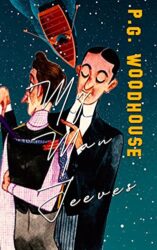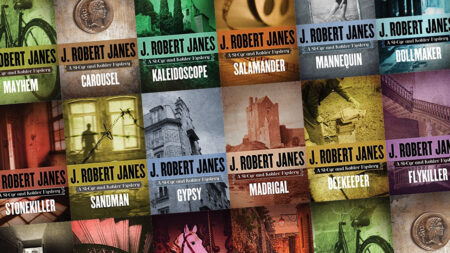Jeeves Books In Order: How to read P.G. Wodehouse’s series?
Created by legendary English author and Humorist Sir Pelham Grenville Wodehouse (or simply P. G. Wodehouse), the Jeeves and Wooster Series is a comedic collection of stories. This is about Jeeves, the highly competent valet–not a butler–of a wealthy and idle young Londoner named Bertie Wooster.
The two characters first appeared in “Extricating Young Gussie”, a short story published in the US in September 1915 (the next year in the UK). At that point, Jeeves was not fully developed, but that changed with the second story, “Leave It to Jeeves.” The Jeeves series is consisting of 35 short stories and 11 novels–Bertie Wooster narrates (in the first person) all the stories but two. A lot of those have been adapted for television, radio, cinema, theatre, comics, and more.
How to Read the Jeeves Series In Order?
- The Man with Two Left Feet (1917) – A collection of short stories, including “Extricating Young Gussie,” the first appearance in print of Jeeves and his master Bertie, and Bertie’s fearsome Aunt Agatha.
- My Man Jeeves (1919) – A collection of eight short stories, four of them featuring Jeeves and Bertie Wooster. They all were reprinted–and slightly rewritten–in the 1925 collection Carry On, Jeeves. “Leave It to Jeeves” (late retitled “The Artistic Career of Corky”), “The Aunt and the Sluggard”, “Jeeves and the Unbidden Guest”, “Jeeves and the Hard-boiled Egg.”
- The Inimitable Jeeves (1923) – This is a semi-novel collecting Jeeves’ stories. The novel combined 11 previously published stories, of which the first six and the last were split in two, to make a book of 18 chapters.
- Carry On, Jeeves (1925) – A collection of ten uproarious short stories–four of which were already published in My Man Jeeves, see before–including “Jeeves Takes Charge,” “The Rummy Affair of Old Biffy,” “Bertie Changes His Mind,” and more.
- Very Good, Jeeves (1930)- A collection of ten uproarious short stories in which Jeeves endeavors to give satisfaction: By saving a grumpy cabinet minister from being marooned and attacked by a swan – in the process saving Bertie Wooster from his impending doom…By rescuing Bingo Little and Tuppy Glossop from the soup (twice each)…By arranging rather too many performances of the song ‘Sonny Boy’ to a not very appreciative audience…And by a variety of other sparkling stratagems that should reduce you to helpless laughter.
- Thank You, Jeeves (1934) – The first full-length Jeeves novel. In high dudgeon, Bertie disappears to the country as a guest of his chum Chuffy – only to find his peace shattered by the arrival of his ex-fiancée Pauline Stoker, her formidable father, and the eminent loony doctor Sir Roderick Glossop. When Chuffy falls in love with Pauline and Bertie seems to be caught in flagrante, a situation boils up that only Jeeves (whether employed or not) can simmer down…
- Right Ho, Jeeves (“Brinkley Manor” in the US, 1934) – Gussie falls irrevocably in love with the mushy, sentimental but gorgeous blonde Madeleine Basset but his shyness prevents him from revealing his feelings. Her father, a cantankerous specimen if ever there was one, is the local magistrate and lives with his extensive collection of antique silver in Totleigh Towers. Bertie arrives at Brinkley ostensibly to comfort his cousin Angela, who has just broken her engagement with Tuppy Glossop.
- The Code of the Woosters (1938) – When Aunt Dahlia demands that Bertie Wooster help her dupe an antique dealer into selling her an 18th-century cow creamer. Dahlia trumps Bertie’s objections by threatening to sever his standing invitation to her house for lunch, an unthinkable prospect given Bertie’s devotion to the cooking of her chef, Anatole. A web of complications grows as Bertie’s pal Gussie Fink-Nottle wants to study the effects of a full moon on the love life of newts.
- Joy in the Morning (“Jeeves in the Morning” in the US, 1946) – Steeple Bumphleigh is a very picturesque place. But for Bertie Wooster, it is a place to be avoided, containing not only the appalling Aunt Agatha but also her husband, the terrifying Lord Worplesdon. So when a certain amount of familial arm-twisting is applied, Bertie heads for the sticks in fear and trepidation despite the support of the irreplaceable Jeeves.
- The Mating Season (1949) – At Deverill Hall, an idyllic Tudor manor in the picture-perfect village of King’s Deverill, impostors are in the air. The prime example is man-about-town Bertie Wooster, doing a good turn to Gussie Fink-Nottle by impersonating him while he enjoys fourteen days away from society after being caught taking an unscheduled dip in the fountains of Trafalgar Square. Bertie is of course one of nature’s gentlemen, but the stakes are high: if all is revealed, there’s a danger that Gussie’s simpering fiancée Madeline may turn her wide eyes on Bertie instead.
- Ring for Jeeves (1953) – This is the adaptation of the play “Come On, Jeeves,” and the only Jeeves novel without Bertie Wooster. Captain Biggar should make short work of the two bookies who have absconded with his winnings after a freak double made him a fortune. But on this occasion, Honest Patch Perkins and his clerk are not as they seem. In fact, they’re not bookies at all, but the impoverished Bill Belfry, Ninth Earl of Rowcester, and his temporary butler, Jeeves. Bertie Wooster has gone away to a special school teaching the aristocracy to fend for itself ‘in case the social revolution sets in with even greater severity’. But Jeeves will prove just as resourceful without his young master, and brilliant brainwork may yet square the impossible circle for all concerned.
- Jeeves and the Feudal Spirit (“Bertie Wooster Sees It Through” in the US, 1954) – The beefy ‘Stilton’ Cheesewright has drawn Bertie Wooster as red-hot favorite in the Drones Club annual darts tournament – which is lucky for Bertie because otherwise Stilton would have beaten him to a pulp and buttered the lawn with him. Stilton does not, after all like men who he thinks are trifling with his fiancée’s affections. Meanwhile, Bertie has committed a more heinous offense by growing a mustache, and Jeeves strongly disapproves – which is unfortunate, because Jeeves’s feudal spirit is desperately needed.
- Jeeves in the Offing (“How Right You Are, Jeeves” in the US, 1960) – Jeeves is on holiday in Herne Bay, and while he’s away the world caves in on Bertie Wooster. For a start, he’s astonished to read in The Times of his engagement to the mercurial Bobbie Wickham. Then at Brinkley Court, his Aunt Dahlia’s establishment, he finds his awful former headmaster in attendance ready to award the prizes at Market Snodsbury Grammar School. And finally, the Brinkley butler turns out for reasons of his own to be Bertie’s nemesis in disguise, the brain surgeon Sir Roderick Glossop.
- Stiff Upper Lip, Jeeves (1963) – Bertie Wooster looks pretty stylish in his new Tyrolean hat – or so he thinks: others, notably Jeeves, disagree. But when Bertie embarks on an errand of mercy to Totleigh Towers, things get quickly out of control and he’s going to need all the help Jeeves can provide. There are good eggs present, such as Gussie Fink-Nottle and the Rev. ‘Stinker’ Pinker. But there also is Sir Watkyn Bassett J.P., the enemy of all the Woosters hold dear, to say nothing of his daughter Madeline and Roderick Spode, now raised to the peerage. And Major Brabazon Plank, the peppery explorer, who wants to lay Bertie out cold.
- Much Obliged, Jeeves (“Jeeves and the Tie That Binds” in the US, 1971) – Just as Bertie Wooster is a member of the Drones Club, Jeeves has a club of his own, the Junior Ganymede, exclusively for butlers and gentlemen’s gentlemen. In its inner sanctum is kept the Book of Revelations, where the less-than-perfect habits of their employers are lovingly recorded. The book is, of course, pure dynamite. So what happens when it disappears into potentially hostile hands?

- Aunts Aren’t Gentlemen (“The Cat-nappers” in the US, 1974) – Bertie Wooster has been overdoing metropolitan life a bit, and the doctor orders fresh air in the depths of the country. But after moving with Jeeves to his cottage at Maiden Eggesford, Bertie soon finds himself surrounded by aunts – not only his redoubtable Aunt Dahlia but an aunt of Jeeves’s too. Add a hyper-sensitive racehorse, a very important cat and a decidedly bossy fiancée – and all the ingredients are present for a plot in which aunts can exert their terrible authority. But Jeeves, of course, can cope with everything – even aunts, and even the country.
Jeeves and Wooster Stories, not written by P.G. Wodehouse
“Aunts Aren’t Gentlemen” is the last novel in the Jeeves series written by P.G. Wodehouse, but the Wodehouse estate authorized the publication of a few “hommage” books written by other writers.
- Jeeves and the Wedding Bells (2013) – Written by British novelist Sebastian Faulks, the first writer authorized by the Wodehouse estate to write a new Jeeves and Wooster story. Bertie Wooster is staying at the stately home of Sir Henry Hackwood in Dorset. He is more than familiar with the country-house set-up: he is a veteran of the cocktail hour and, thanks to Jeeves, his gentleman’s personal gentleman, is never less than immaculately dressed. On this occasion, however, it is Jeeves who is to be seen in the drawing room while Bertie finds himself below stairs – which he doesn’t care for at all.
- Jeeves and the King of Clubs (2018) – Written by Ben Schott. Storm clouds loom over Europe. Treason is afoot in the highest social circles. The very security of the nation is in peril. Jeeves, it transpires, has long been an agent of British Intelligence, but now His Majesty’s Government must turn to the one man who can help . . . Bertie Wooster.
- Jeeves and the Leap of Faith (2020) – Written by Ben Schott. The Drones club’s in peril. Gussie’s in love. Spode’s on the warpath. And His Majesty’s Government needs a favor. Thank goodness Bertie Wooster is back! From the mean streets of Mayfair to the scheming spires of Cambridge, prepare to meet a joyous cast of characters: chiseling painters and criminal bookies, eccentric philosophers and dodgy clairvoyants, appalling poets and pocket dictators, vexatious aunts, and their vicious hounds.
If you like our article about Jeeves and Wooster books in order, don’t forget to bookmark it!























